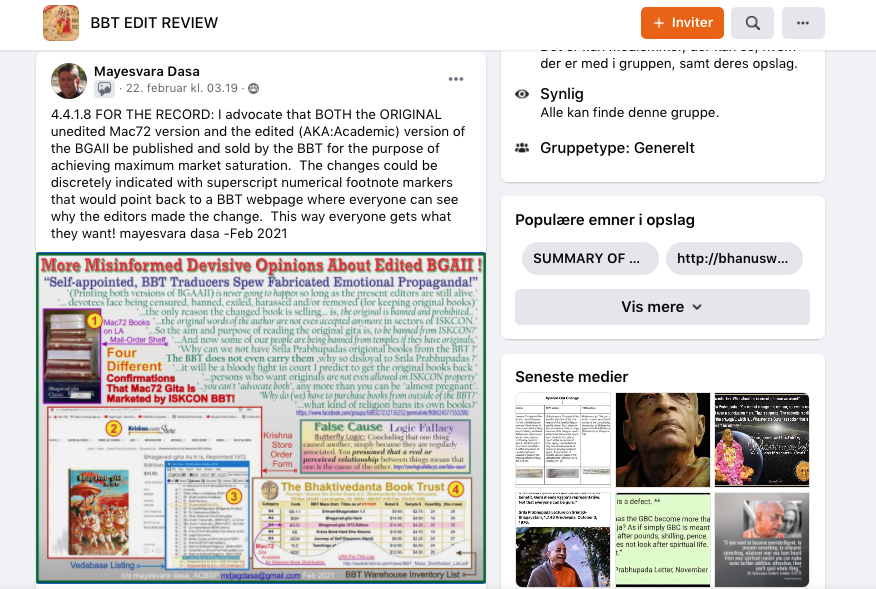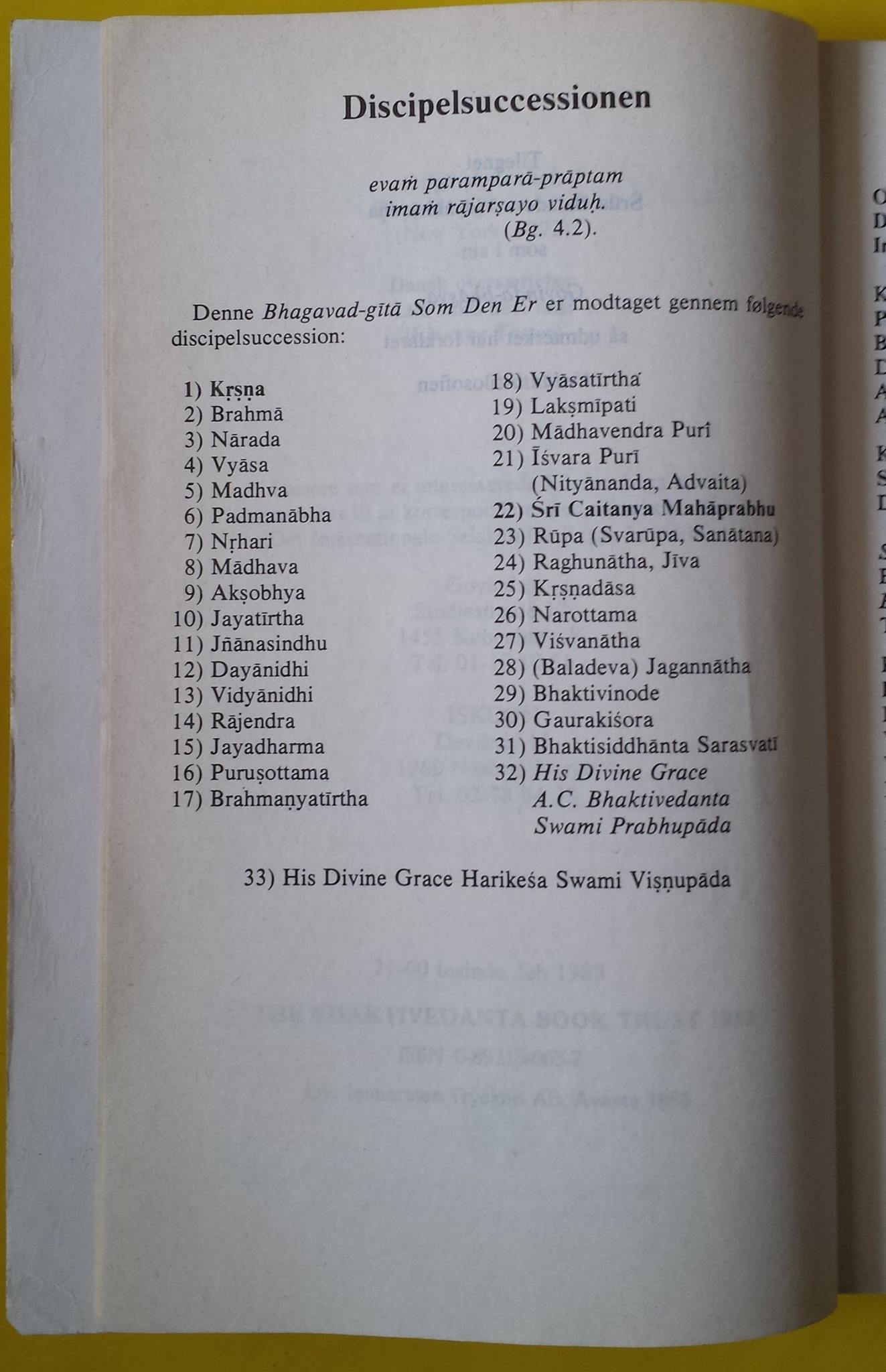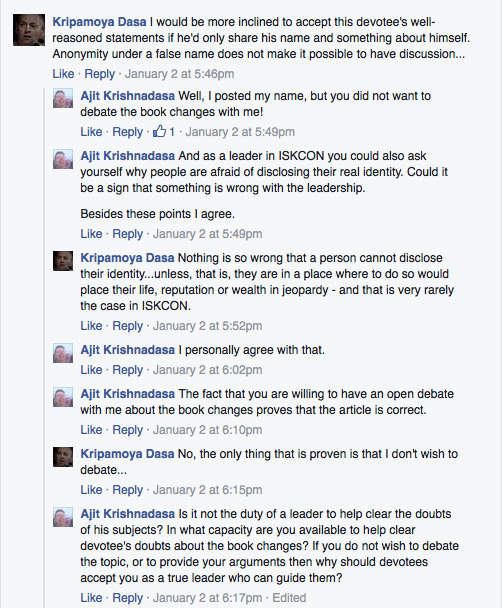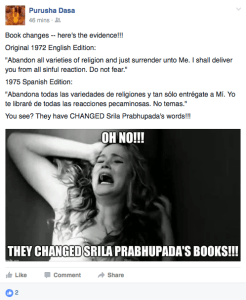By Garuda Dasa (Graham M. Schweig)
Someone alerted me to this publically available statement that Satsvarupa Das Goswami wrote:
“Bhagavad-gita Editing”
“I received a letter from a disciple who told me he prefers reading the first edition of the Bhagavad-gita edited by Hayagriva. He thinks there are too many changes in the second edition edited by Jayadvaita. But I do not agree with this point of view. Jayadvaita and Dravida published a booklet, Responsible Publishing. There they demonstrated the many omissions Hayagriva made from Prabhupada’s original manuscripts. Jayadvaita restored the original material by Prabhupada and did responsible editing of his English. Prabhupada had implicit faith in Jayadvaita Maharaja and kept him as his editor for Srimad-Bhagavatam. He said that Jayadvaita’s editing should not be changed. Now Garuda Prabhu has written an entire book championing the editing version of Hayagriva and criticizing the second edition edited by Jayadvaita. I do not agree with Garuda Prabhu on this topic. My followers should feel confident to read the second edition published by the BBT, edited by Jayadvaita Maharaja, and not the earlier edition done by Hayagriva.”
Several interest points I’d like you to consider:
The first edition of the Bhagavad-gītā As It Is was authored by Śrīla Prabhupāda. It is not the Hayagriva edition. There were others besides Hayagravia who worked on it at the time, including Jayadvaita.
Whether one finds Prabhupāda’s authorized authored edition or the second heavily revised (corrupted) edition preferable or not is beside the point. Which one did Prabhupāda actually author and authorize for sure? The answer is obvious. Which one is questionable? The answer is obvious.
Satsvarupa says he does not agree with Garuda Prabhu on the topic of posthumous editing if it means correcting Jayadvaita’s work. On what basis? He’s read Dravida’s and Jayadvaita’s rationalization for editing, but he’s never read a word of my work on the subject. His decision is not being made from a rational mind but out of loyalty to Jayadvaita. Moreover, is Satsvarupa being loyal to Prabhupāda?
Satsvarupa says, “Now Garuda Prabhu has written an entire book championing the editing version of Hayagriva.” First of all, there is no “editing version of Hayagriva.” Secondly, I’ve not written an entire book “championing” anything. But I hope I’m always championing Prabhupāda himself. Is that so distasteful to Satsvaraupa?
Isn’t Satsvarupa making a foregone conclusion here by telling his followers to read Jayadvaita’s edition? But he says more . . . he’s telling his followers NOT to read Prabhupāda’s original authorized edition! And calling it the “earlier edition done by Hayagriva”! Does he foget that Hayagriva, Jayadvaita, and others worked UNDER Prabhupāda? Does he not realize that Dravida and Jayadvaita have been working OVER Prabhupāda since his departure?
Just throwing these points out to all of you.
Tomorrow is Vyāsa Pūjā for our beloved Śrīla Prabhupāda, the original world teacher of Krishna bhakti. How can we honor him in the best way? By following his instructions, instructions not filtered through the limited brains of Jayadvaita, Satsvarupa, Dravida, mine, or anyone else’s. Let us not try to better Prabhupāda as Jayadviata has been attempting to do. Let us try to better ourselves in our relationship wtih Prabhupāda!
On this Vyāsa Pūjā, let us all receive the gifts Prabhupāda has given us graciously, and reciprocate Prabhupāda’s loving gifts by preserving, absorbing, and sharing his teachings.
Dāso ‘smi premni,
Garuḍa Dāsa




















You must be logged in to post a comment.